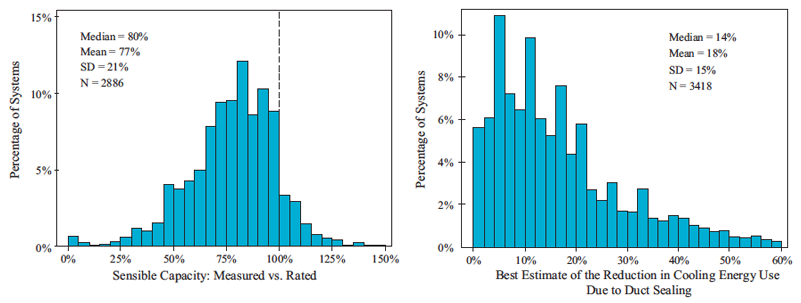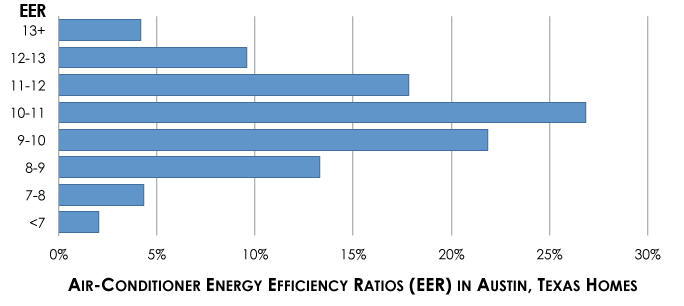Energy audit analysis
This study analyzed of a unique dataset of nearly 5000 energy audits performed on homes in Austin, Texas in 2009–2010. We quantified the prevalence of typical air-conditioner design and installation issues, such as low efficiency, oversizing, duct leakage, and low measured capacity, and estimated the impacts that resolving these issues would have on peak power demand and cooling energy consumption. We first estimated that air-conditioner use in single-family residences currently accounts for 17–18% of peak demand in Austin. Then, using the distribution of energy efficiency ratios (EER) below, we estimated that improving equipment efficiency alone (by upgrading everyone to EER 14) could save up to 205 MW, or 8%, of peak demand.
Additionally, we estimated that 31% of systems in this study were oversized, leading to up to 41 MW of excess peak demand. Replacing oversized systems with correctly sized higher efficiency units has the potential for further savings of up to 81 MW. We also estimated that the mean system could achieve 18% and 20% in cooling energy savings by sealing duct leaks and servicing their air-conditioning units to achieve 100% of nominal capacity, respectively.

Estimates of (a) distribution of savings due to hypothetical duct sealing and (b) distribution of measured cooling capacity vs. rated
Although this analysis is limited to the City of Austin, understanding the methods described herein could allow electric utilities in similar climates to make better-informed decisions when considering efficiency improvement programs.
Read the full paper published in Energy and Building in 2011 here. Also read about this study in our guest blog post on Scientific American.
Acknowledgements
This work was performed by Brent Stephens while he was a Ph.D. student under the supervision of Dr. Jeffrey Siegel and Joshua Rhodes, a Ph.D. student under the supervision of Dr. Michael Webber, both at the University of Texas at Austin. Brent’s contribution was funded in part by the National Science Foundation (IGERT Award DGE 0549428) and Josh’s contribution was funded by Pecan Street, Inc., a 501(c)3 nonprofit public-private partnership in Austin, Texas, as well as by the University of Texas at Austin. We thank Christopher Frye and Timothy Kisner (both at Austin Energy) for their intellectual contributions as well as their help with understanding the audit database.

